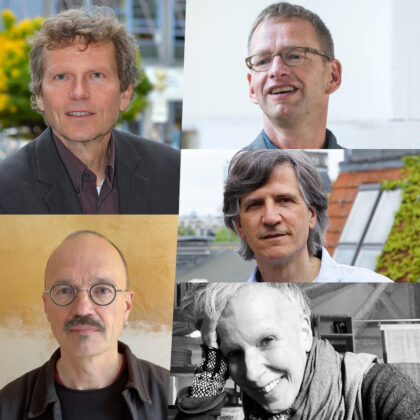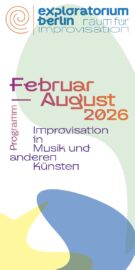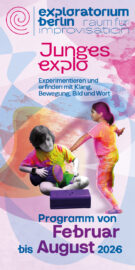“The blind spot, the unavailable, that which is not there but is nevertheless there – that fascinates me greatly. It’s like good improvisation: you don’t have it at your disposal, but it can arise. You can only practise this by trying to adopt an open attitude of resonance. It is always this struggle for what is not yet there, what is not self-evident, what you cannot control and certainly cannot possess. That is something that fascinates me incredibly.” (Charlotte Hug)
“At the heart of improvising musicians’ accounts of interaction in an ensemble is a specific experience: listening, holding back, giving space to the other musicians and to the music. This attitude of “listening and responding”, i.e. dispositional resonance, is a prerequisite for music to take over and a kind of magic to emerge […].” (Martin Pfleiderer & Hartmut Rosa)
Improvisation thrives on the moment, on attention, movement and encounter. Resonance – as echo, reverberation, response – appears not only as a possible result, but perhaps even as an inner condition of improvisational action. The 11th symposium organised by exploratorium berlin invites participants to think of improvisation as an event of resonance – aesthetic and performative, social and epistemic, sonic and physical. The focus is on free, experimental improvisation in music, but connections to other advanced art forms will also be explored.
Four key questions structure the symposium and serve as a starting point for joint discussion: What does resonance mean in the context of improvisation? Can resonance be understood as a specific quality in improvisation processes? How can resonance be experienced in improvised processes – between people, spaces, sounds, times? And how can the momentary, situational, response- and echo-oriented nature of improvisation be analytically captured by the concept of resonance?
Originating in acoustics, the concept of resonance opens up a wide range of associations. Its metaphorical and analytical scope makes it compatible with artistic practices, musical-philosophical considerations and social science theory formation. The term has had a remarkable career, particularly in Hartmut Rosa’s sociology, which is influenced by critical theory. There, he describes resonance as a fundamental form of relating to the world – a concept that can be productively transferred to improvisational processes.
Resonance can be understood not only as a goal, but also as a moment of insight: the essence of improvisational action is revealed in the characteristics of resonance – for example, as affective feedback, as transformation through touch and response. As a decidedly relational concept, resonance allows for the analysis of diverse recursive and interdependent principles of action: the interaction of the players, the phenomenon of hearing and listening, the sensing of the vibrations of the natural frequencies of instrumental sound bodies, the intuitive understanding of the affordances of spaces, atmospheres and audiences, ultimately of all participating actants. Resonance phenomena can play a decisive role as a driving force within emergent improvisation processes. The autopoietic feedback loop that is effective in improvisations between actants can be understood as circulating energy, as Rosa identifies it in resonance relationships.
According to Rosa, four key preconditions for relationships of resonance can be identified: affectability, self-efficacy, transformation, and unavailability. These four characteristics also seem fundamental to improvisational processes: they require openness to impulses, active responses, a willingness to change and acceptance of the unavailable. Rosa devotes particular attention to the concept of unavailability; the symposium also aims to address this aspect of unpredictability and uncontrollability in relation to improvisation. Rosa’s concept of mediopassivity, the space between activity and passivity, which also proves to be significant for improvisational action, will also be given special attention.
Contributions:
Christoph Baumann: Resonanz-gemeinsamer musikalischer Raum – Hyperinstrument
Ulrike Brand: BODY_CELLO_MASS
Corinna Eikmeier: Unverfügbarkeit
Silvana Figueroa-Dreher: Improvisieren durch Modi der Resonanz
Jonas Gerigk: „In Resonanz“ – Kirchenkonzerte mit dem Trio vließ
Christian Grüny: Resonanz, Responsivität, Hören: Zwischen Begriff und Metapher
Stephanie Hanna: Körper Spüren: Resonanzen und kollektives Bewusstsein
Diego Kohn: Plastische Resonanz: Improvisation zwischen Form, Wandel und Offenheit
Ivar Roban Križić: ESP Duos: Imaginierte Ko-Präsenz und die resonanten Spuren der Zusammenarbeit
Thomas Lange: Resonanzlehre und freie, musikalische Improvisation (Vortrag) + Improvisation Resonanz Improvisation. Die (Wieder-)Entdeckung radikaler Schönheiten in der freien, musikalischen Improvisation (Workshop)
Susanne Martin & Katarzyna Brzezinska: Das tänzerische Mediopassiv – Berührung in der Contact Improvisation
Sarah Maupeu & Johanna Seiler: Die Widmungsabsicht als Weg zu Resonanzerleben. Das HeilSang-Format von Johanna Seiler zwischen freier Vokalimprovisation und transformativer Erfahrung.
Jürgen Oberschmidt: Musik lernen: Von der Planbarkeit durchwaltet oder in die Freiheit entlassen?
Anna Pietsch: Improvisation und Resonanz: Anatomie einer Begegnung (Vortrag & Atelier)
Martin Pfleiderer & Hartmut Rosa: Improvisation und Resonanz
Jakob Ruster: Resonanz in der Improvisation – von Geburt an? Die Theorie der Communicative Musicality von Colwyn Trevarthen und Stephen Malloch und kindlich-spielerische Resonanzerfahrung
Christopher Salzbrunn: Unreproduzierbare Musik – Die Reformation der Postmoderne in der improvisierten Literatur
Wolfgang Schliemann: „Beim Hören bin ich auf der Schwelle.“
Sue Schlotte: „Sowohl als auch: Gleichzeitige Wahrnehmung als Schlüssel für gelungene freie Improvisation!“ – ein praktischer Vortrag
Eric Thielemans: Resonant Scores: Exploring Resonance Through Emergent Music Practice. A practical exploration of resonance within and through musical performance
Dietmar Jürgen Wetzel: Stimme, Resonanz und Humor – kulturelle Praktiken vokaler Improvisation
Opening Event on Friday, 30 January 2026, 8.00 pm:
Sound & Lecture N° 27: Charlotte Hug / Lê Quan Ninh – Resonances
The symposium will open on 30 January 2026 at 8 pm with the 27th edition of the exploratorium’s Sound & Lecture series, featuring a performance by violist, vocalist and winner of the 2025 Swiss Music Prize Charlotte Hug together with percussionist Lê Quan Ninh. Charlotte Hug drew significant inspiration for her artistic work from her engagement with Hartmut Rosa’s concept of resonance; for Lê Quan Ninh, interaction with the resonant qualities of his instruments is of central importance. They will discuss this in an artist talk with Mathias Maschat.
Evening programme on Saturday, 31 January 2026, 8.00 pm:
Recovered Resonances: Sofia Borges & Brad Henkel
The project Recovered Resonances by percussionist Sofia Borges and trumpeter Brad Henkel explores the profound act of sonic reclamation: capturing vanishing resonance, actively recovering it, and reshaping it into new life. At its core lies meta-resonance – the deliberate retrieval and transformation of acoustic energy and its physical source. (Recovered Resonances is supported by the Senatsverwaltung für Kultur und Gesellschaftlichen Zusammenhalt.)
DOWNLOAD CALL FOR PAPERS SYMPOSIUM: IMPROVISATION UND RESONANZ (GERMAN ONLY)


